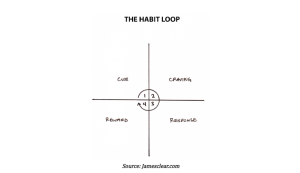Table of Contents
ToggleWhat are your resolutions for the new year?
Is it the same as last year? Is it physical fitness or saving money or the addition of a new skill?
Every year feels like deja vu when resolutions are made, but some of us still end up making the same resolutions for the coming year. Physical fitness is the most procrastinated resolution! Many of us will agree with this part.
You might have your schedule ready like waking up early, drinking black coffee for pre-workout, eating healthy the entire day, and following a keto diet or intermittent fasting.
Has this planning ever been implemented? Perhaps for a week or a month, but are you consistent all year long? Some may be, but the majority of people are not, and that’s okay!
HABIT is what hinders the latter part of people from staying or following a particular path.
What are habits?
Every day, you make small decisions and perform actions that form your habits. A person’s life today is largely determined by their habits. For instance, are you happy or unhappy? Are you fit or out of shape? How successful or unsuccessful are you?
All these scenarios of life are determined by your habits. The actions you take each day and the thoughts you think ultimately determine the person you are, the beliefs you hold & the character you portray!
James Clear, author of Atomic Habits quotes that “once you learn to transform your habits you can transform your life”.
Let’s finally understand why most people fail to achieve the most procrastinated goal- PHYSICAL FITNESS!
James Clear, in his book called Atomic Habits, talked about the 4 stages of habits. All our habits follow the same pattern. Our brain runs through these steps exactly in the same order each time.

The Cue & Craving of the habit loop is known to be the ‘Problem phase’. This phase brings out the need to change something. Your desire to be physically fit this year comes under the problem phase as you need to change this. However, change will not happen overnight until you work towards it.
This leads to Response & Reward aka the Solution Phase. This phase involves you taking action & arouses a desire to achieve the goal. Waking up early, or going for a walk or workout is the action you take under the solution phase.
This 4 step process is an endless loop that our brain starts processing from an early stage of life. Every day, our brain constantly scans the environment trying to predict what will happen next, experimenting with different responses, and learning from the results. All of this happens in a split second, and we use it again and again without even realizing what happened before.
Mentioned below are some real-life examples that we do:

Problem-solving is the driving force behind all behavior. There are times when you observe something good and want to obtain it. Pain can sometimes be the problem, and your goal is to relieve it. In either case, every habit aims to solve a problem.
You can simply ask yourself these questions when you want to change your behavior:
- In order to make it obvious, what can I do?
- Is there anything I can do to make it more appealing?
- Is there anything I can do to make it easier?
- Is there anything I can do to make it more satisfying?
if you’ve ever wondered why you don’t follow through on your promises, why you don’t lose weight, or why you smoke, then these four laws may be for you.
this is how you can build a fitness habit!
- Start with an incredibly small habit
Most people set up goals that are difficult to achieve on the first go. Thus, after a continuation of 1-2 days, they end up not being consistent. Many people might relate to this, but the question is why does this happen?
This happens because we make targets that are not easy to achieve & thus we end up losing motivation. As mentioned in Atomic Habits, there is a motivation wave that rises & falls. The reason behind this is not making easy targets.
When you plan for a workout, don’t just go for 50 pushups in a day, start small and go for 5 instead. The reason is simple the harder workout you start the fastest you lose your motivation. Go slow for at least 2-3 weeks, get your body habitual of working out, and then slowly increase your habit!
- Increase your habit in small ways
Gradually increasing your workout can do wonders for you without causing any pain to your motivational wave. Once you get your body into a habit of working out, slowly increase your weight. You might have seen people taking on 40-50kgs weight right after starting with a smaller one.
To maintain the consistency of your habit increasing it in small ways, rather than big ways is the key! Add 1% each day!
Success is a few simple disciplines, practiced every day; while failure is simply a few errors in judgment, repeated every day.
—Jim Rohn
Moving forward, break your habits into small chunks
The only thing standing in your way to achieving your physical fitness goal this year is your HABITS! Now moving forward, as you have started adding 1% each day, you will find yourself increasing quickly in a span of 2-3 months. Each habit should be reasonable so that you can maintain momentum and make the behavior as simple as possible.
Going for 50 squats a day? How about taking 5 sets of squats instead? Or going for a 30 min cardio session, why not break it into 15 mins each session? Will that be easy for you, YES!
It is very crucial to breaking your habits into small chunks, this way it gets easier.
Psychology states that the easy you go, the fastest you get into the habit of something! The harder you go, the tougher it becomes to be consistent!
- Get back on track if you slip!
The best way to improve your self-control is to see how and why you lose control.
—Kelly McGonigal
There are days when we feel lazy enough to go for our workout, and this is completely normal! However, the only way you’ll make a difference here is by getting back on track as soon as possible.
Studies show that missing your habit once, no matter when it occurs, does not affect your long-term progress. Do not strive to be perfect, rather let go of your all-or-nothing mentality.
It’s not a good idea to expect failure, but it’s a good idea to plan for it. If you want to prevent your habit from occurring, take some time to think about what you will need to do. Do you have any stumbling blocks? How often do you get pulled off course by daily emergencies? What can you do to bounce back quickly from them and get back on track?
Consistency is more important than perfection. Become a person who never misses a habit!




